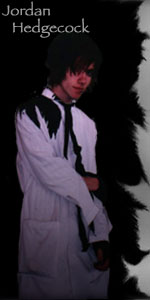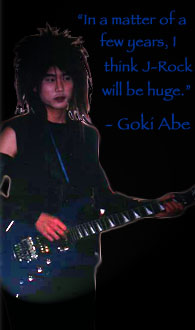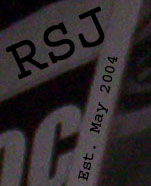|

Though largely unavailable through US distributors, Japanese music and its accompanying style has found a following
amongst American youth. Many of these J-Rock and pop supporters found their way to Otakon, the nation's premier anime convention,
held in Baltimore, MD July 30 - August 1. The convention featured the first American appearance of Japan's biggest rock act,
L'Arc-en-Ciel.
 Otakon provided a logical venue for these fans to gather, as it is the use of Japanese music in anime that led many to find
these artists. "I wanted to know more about anime music, and that transitioned into [finding] J-Rock and J-Pop, "
said convention-goer Mavrick Marquee. Samantha Jones adds that she "stumbled upon an X-Japan song in the X series."
The internet has also played a significant role in spreading Japanese music, as its limited availability in American markets
makes it impossible for fans to simply walk into most stores to purchase these albums. Jordan Hedgecock mentions that it
was browsing on message boards which first led him to this music, though he points out that this type of exposure is hardly
going to be enough to create a significant following in the US, as "word of mouth only works so much."
 While Visual Kei style, almost a Japanese version of glam rock, may be what first intrigues many American followers, those
at Otakon emphasized that it is the music itself that held their interest. "Style is something that's good and everything,
but I'm going to listen to somebody because of their sound," said Marquee. "When I listen to somebody, I'm not
seeing who they are." Jones agrees, adding that "the music is what gets to me, and the look is just a prize to
go with it." Christopher Rabjohn further points out that it is the mix of many different genres into the J-Pop sound
that gains it a wide variety of fans. "There's something for everybody. No matter what you like, you'll find something
in J-Pop that you like." This is largely acknowledged by the fans due to the fact that J-Rock isn't a specific style
of music. Many types of music are played within the J-Rock/Visual Kei genre. You will find everything from metal and hardcore,
to piano solos and heavy orchestral pieces. All of which are blended into the sounds produced by any one of these bands.
There is no area they are not allowed to explore freely. Performance, as well, plays a significant part in what many appreciate
about these bands. Inside the Visual Kei genre emphasis is put onto the look, style, and show with a high degree of fashion,
much like the Ziggy Stardust days of David Bowie. The style was started in the late 80's by X-Japan, and one of the best
examples of this is Malice Mizer, who instead of toning down their look and show as they gained popularity, only got bolder
and more outrageous. "They put a lot into their performance, rather than just getting up on stage and playing the music,"
said Hedgecock. "Out of tour dvds that I've watched, they just seem to be more into the music that they're making."
 One person for whom American interest is very important is Goki Abe, a second-generation Japanese musician who plans to start
the first Visual Kei band in the US. "I came down to Otakon to recruit other pro grade musicians who share the same
dream as I do," said Abe. As a musician, he finds that J-Rock allows a greater freedom than he sees in the American
music scene, in which he feels that "one sound sells; one image sells." (i.e. MTV and national radio playlists)
He believes that the Japanese music industry allows "J-Rock bands to express themselves. There's a lot of indie bands,
and they're allowed to create their own music, and they are able to come up with fresh melody lines because of the freedom
that they have over there."
Creating music in what is very much an underground scene in the US has not been easy for Abe, however. He feels that
the most difficult thing is "finding the right musicians who are into this stuff, who are willing to be brothers to move
forward with you.
 Especially in this country, you don't find a lot of musicians who want to do J-Rock. The scene is dominated by hardcore or
classic rock bands."
Abe views Otakon as the perfect venue to begin expanding the music's fanbase. "I think the anime convention is definitely
serving as a gateway to expanding J-Rock." Other convention participants also pointed out that touring in the US would
likely help these bands gain popularity. "I would love to see Dir En Grey, if they would come, because they're just
so into their music; they're so passionate about it," said Jones. Alicia Gagliano, who plans to incorporate J-Rock style
into her own career in fashion design, suggests that the music might become more popular "if it appeared in movies."
The recent founding of tofu Records , the first domestic distribution company for J-Rock and J-Pop, has set the stage
for greater availability and acceptance of these styles of music. Abe feels that the time is right for taking some of these
steps to expand the following. "I think there's a huge momentum right now. If we just keep this up, in a matter of
a few years, I think J-Rock will be huge."
 |

